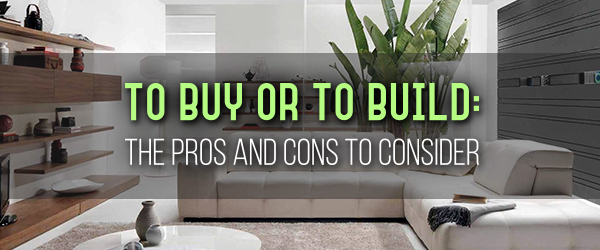When considering relocation, many homebuyers focus on demographics, property conditions, market prices, and personal requirements. However, before addressing these topics, there’s a straightforward question one must answer: to buy or build a home?
There are a number of advantages and disadvantages to each of these options, here, we will discuss them all.
Pros of Buying a House
With less individual time and work commitments, buying a home is undoubtedly the more convenient option. By simply hiring and collaborating with a real estate agent, finding the ideal property, making an offer, and strategically negotiating are all streamlined with their assistance.
An agent will also help you with the entirety of paperwork involved in buying a home, and answer any questions you might have throughout the process. With a real estate specialist instead of a contractor, you can find, purchase, and settle into your home in as little as two months.
This method of home owning is perfect for those who are on a tight deadline. If you need to get out of your current housing situation by a specific date, buying a home is your best option. It’s also a good option for those relocating for work or for those who have children who are about to start a new school year.
Buying a home typically coincides with buying to an established community; one that’s close to schools, offices, stores, and even bike paths. These houses also often have more mature landscaping, too. Homes may vary in price, but buying an existing home is generally more affordable than building one from the ground up.
Cons of Buying a House
There are some downsides to buying a home, however. While it might be more convenient to purchase an existing house, opportunities for customization, without spending more money, are limited. You may have to settle for a house that doesn’t entirely fit your dream home concept. You may also find that affordable, but older homes, simply don’t meet your needs or require thorough repairs.
Houses, even newer ones, are rarely bought in pristine condition. You’ll find that you will have to spend a little extra money on repairs, redecorating, or remodeling no matter where you buy.
Updating your house may eventually lead you to buyer’s remorse as you discover that you have to sink a lot more money into a property to get what you want out of it.
Pros of Home Building
Building a home has a multitude of benefits. First, there’s no worry about competing bids. No one can try to swoop in and steal, or up the price, of your dream home.
You’re also involved in every step of the home building process, and can, therefore, customize everything, even the layout of the house. You decide what flooring to install, what fixtures go where, and the color scheme and decor from top to bottom.
While building a home is entirely personalized, many contractors start with a template. A generic outline might seem to take away from total customization, but it helps keep the cost of building down. New houses are also almost always built to meet specific energy guidelines, which means you’ll use less energy when adjusting the temperature. There’s also no fear of lead paint, asbestos, mold, or other harmful substances in the home.
They use modern technology to keep your costs in check, and unlike existing homes, you know there won’t be any repairs you need to make. Everything will be brand new. Since you helped design the home, you’ll feel an instant connection to it, too.
Cons of Home Building
There are some downsides to building a house, though. First, it does require more time and more money. Because you have to purchase the land, hire a contractor, and fill the interior of your house with appliances, furniture, and amenities, building a home is a more expensive alternative to buying. Often, homebuilders find that it’s much easier to underbudget, as many small building details add up unknowingly over time.
Speaking of time, building a home usually takes seven months on average. If you need to move right away, that’s not an option. You may have to rent a home or stay with a relative between selling your current house and moving into your new one. There’s also less negotiation like there is with buying a house. Builders have a fixed price, and you’ll be expected to meet it.
There are some other concerns, such as buying land that has access to the city’s water and sewage supply. If your land doesn’t, you may need a well and a septic system. You may also need to get specific building permits. These and other unexpected expenses can also impact your budget.
Of course, markets do differ from location to location. Check into buying homes and building houses in your area before you make a decision. You might be surprised at how affordable it is to build your dream house.









